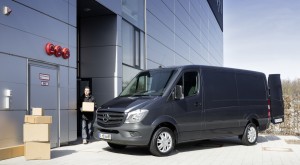The tall, awkward-looking Sprinter van may be getting a little brother in the U.S. in the near term. Mercedes-Benz is looking at adding a small, commercial-oriented van to the Sprinter line in the U.S., a key MBUSA executive said this week.
Bernhard Glaser, vice president of MBUSA’s new van division, said during a visit to Detroit that demand for small commercial vans is expected to grow rapidly in the next few years, making it a promising market for potential expansion of the maker’s van lineup in the U.S.
“It’s certainly something that we’re keeping an eye on,” he said.
Daimler AG, Mercedes’ German parent, already sells a small commercial van, known as the Vito in Europe, and competitors have suggested the van division might be interested in shipping a version of it to North America. The small commercial van segment is expected to grow to upwards of 100,00 units annually. Ford, Nissan, General Motors and Fiat Chrysler Automobiles (FCA) are also eyeing or committed to the small van segment.
Mercedes would have to find a way around the so-called “Chicken Tax,” which imposes a 25% import duty on all commercial vans imported into the U.S.
The import duty, however, has stopped Daimler from building a successful full-size van business in the U.S.-based on the Sprinter, a tall, narrow van, which has carved out a niche for itself in the American market during the past decade, Glaser noted. The Sprinter are assembled in Germany, broken down and then re-assembled at a site near Charleston, S.C.
The Sprinter was originally introduced in 2001 and sales have of the Mercedes-Benz and Freightliner-branded versions have grown steadily since the end of the recession in 2009. Sales have going up each year since 2010 and Mercedes has managed to expand its share in a full-size van segment long dominated by GM and Ford.
(Tesla adds additional protection for battery on Model S. For more, Click Here.)
With its unique silhouette, the Sprinter has also helped transform what has once a sleepy corner of the business. Nissan, FCA, Ford and GM are now planning to offer their own tall, Eurostyle vans in the next year or so, Glaser noted.
(Click Here to get details on Toyota’s Avalon recall.)
“I guess imitation is the sincerest form of flattery,” added Glaser, noting the tall vans are becoming a more common sight in major metropolitan areas.
(To see more about Ford’s $500 million engine plant investment, Click Here.)
Glaser added one of the biggest challenges facing the van division is convincing customers that a Mercedes-Benz branded vehicle isn’t too expensive. The cost of ownership is lower and the residual value at trade in is significantly higher than comparable vehicles from American rivals, he said. To fight perceptions that Mercedes-Benz and Freightliner vans are too expensive, MBUSA is now including the price in any advertising it does.

